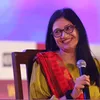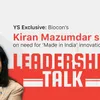Four of India’s finest women leaders decode what’s next for India @ 75
As we look ahead to what the future holds for the nation, at TechSparks 2021, we are celebrating stories that have immensely impacted India’s growth story and paved the way for what's next for India.
As independent India prepares to turn 75 on August 15, 2022, a surge of energy and an unshakeable resolve on the part of the government, a thriving entrepreneurial spirit, a collaborative business landscape, and an unprecedented demographic dividend, is transforming the country and giving the world new reasons to take notice of the country.
As we look ahead to what the future holds for the nation, Intel along with YourStory at Techsparks 2021 celebrated stories that have immensely impacted India’s growth story and laid a strong foundation in this new digital era.
In a riveting session brimming with insights and warm camaraderie, four of India’s women leaders, who have not only made it to the top in their respective fields globally but are also at the helm of India’s digital transformation, came together to decode what’s next for India @ 75 while simultaneously making the case for the need of greater diversity in leadership.
A blue-chip technology leader: Nivruti Rai
As the Country Head of Intel India and VP of Intel Foundry Services, Nivruti Rai is one of the top tech executives in the world. She strongly believes in the prowess of artificial intelligence (AI) and is a keen advocate and champion of emerging technologies.

Among her many contributions to nudge the innovation needle, she has been using her position at one of the world’s leading technology companies to promote India’s digitalisation with the focus on creating “population-scale” solutions with technology.
Celebrating India’s journey towards digital transformation and talking about how India faces a historic opportunity to transform into one of the world’s major technology hubs, Nivruti said, “In one year, we moved technology adoption by as much as three years. The world is changing and India is standing at the brink of a historic opportunity to become a technology leader for the world. India is leading in a lot of technology development, advancement as well as digitisation.”
“One of the prowess of our digitisation can be seen from what we did with our biometric Aadhaar. India also administered one billion vaccines, which means 3.5 million a day. Which means in three days, we would have vaccinated entire Israel and in three months, we would have vaccinated the United States.”
“India is a data-rich country. Each person is a data factory with 1.3 billion people generating data, providing value to algorithms with an AI, ML, AR, and VR to name just a few. We have a tremendous opportunity to drive growth for our country and for the world,” she said.
“India is standing at the brink of a historic opportunity to become a technology leader. With technologies like AI and ML, we have an opportunity to leverage our talent, passion, and our national level platforms in various sectors to address the needs of the people in India and the world,” she added.
Nivruti also spoke about the growing importance of Industrial IoT, the potential for India, and how Indians can unleash the potential of AI and become an AI superpower. “I honestly believe that Industrial Revolution 4.0 gives an opportunity to India to become a leader in the world, a leader for developing technology and creating value with technology,” she said.
Cracking the prescription for global recognition: Kiran Mazumdar-Shaw
Kiran Mazumdar-Shaw began her entrepreneurial journey with $500 in her pocket. Four decades later, she is at the helm of Asia's leading biopharmaceuticals enterprise as the Founder and Chairperson of Biocon Ltd., creating affordable and accessible medicines.
Apart from being widely recognised as one of the most influential business leaders in the field of biotechnology, she is also India’s first self-made woman billionaire. Her resilience, strength in the face of adversity, and strong sense of purpose make Kiran someone entrepreneurs and aspiring leaders can look up to.

Kiran spoke about how the COVID-19 pandemic brought the strength of India’s science and technology muscle to the forefront. Indian researchers, innovators, and regulators came together to introduce low-cost diagnostics, develop therapeutics, and conduct research to create safe and effective vaccines, in an unprecedented collaborative effort.
“The pandemic actually put the spotlight on India. Everyone turned to India for supplies at scale,” she said, talking about how India played a central role in supplying drugs to the whole world during the pandemic – whether it was steroids, hydroxychloroquine, or even Remdesivir to low and middle-income countries.
“We are undoubtedly global leaders,” she said as she mentioned a few facts to support her case for India’s pharma leadership. “Forty-four percent of the world’s Abbreviated New Drug Applications (ANDA) come from India. We have one of the largest numbers of pharmaceutical units approved by the US FDA after the US. We have almost 665 pharmaceutical manufacturing units approved by the US FDA."
"We have the largest vaccine capacity in the world. We were always known to be the largest producer of MMR vaccines in the world, and Biocon is also the third-largest producer of insulin in the world."
Talking about the road ahead and “what’s next” for the pharmaceutical industry in India, Kiran said, “Truly, this is an opportunity for us to build on our global leadership when it comes to pharmaceuticals.”
“The next opportunity for us is to innovate our way into the whole global healthcare space through addressing unmet medical needs. So far, we've addressed affordability as an unmet need, but now we need to look at novelty and innovation as an unmet need of addressing many unmet medical conditions.”
Kiran also made parallels between her own journey and the journey of India in establishing credibility with the world. “As a woman entrepreneur, I had to build my credibility. I no longer consider myself a” woman” business leader. But to get here, I've had to overcome many, many, many credibility hurdles,” she said.
“India is also doing the same when it comes to the credibility hurdles that we have to overcome when it comes to what we are doing, playing this global role in pharmaceuticals, in global healthcare, and in innovating new medicines,” she added.
Talking about how having a strong sense of purpose and conviction was foundational in her journey as an entrepreneur. Kiran said, “I have been filled with the purpose of putting India on the map of the world when it comes to biopharmaceuticals. There was this challenge thrown to me by a very large multinational pharmaceutical company that India would never be able to produce a biologic product that can pass muster in the western world. And that actually fired me up to make sure that I proved them wrong.”
She added, “I always believed that everyone in the world can be a winner if they lead their lives with purpose. And I've seen amazing people from the poorest parts of the world, doing amazing things because they have a purpose in life.”
Creating a healthy medical innovation ecosystem: Dr. Sangita Reddy
As a global healthcare leader, an entrepreneur, and a humanitarian, Dr Sangita Reddy has passionately committed to transforming the healthcare system through technological advancements.
As a Joint Managing Director of Apollo Hospitals Enterprise Limited, Asia’s largest and most trusted healthcare group, Dr Sangita is actively engaged with governments and industry bodies on aspects of public health and policy development. She has advocated and influenced policy reforms and is an acclaimed speaker on global healthcare forums around the world, including the World Health Congress

Talking about the demand-supply gap in healthcare and the enhanced burden of disease, she said, “The world has seen COVID. But a larger underlying pandemic is non-communicable diseases.”
One of the critical answers is really to transform healthcare with technology. So speed-to-diagnosis aided by technologies powered by cognitive algorithms, coupled with evidence-based care practices, will result in reducing the length of stay, early diagnosis, or even not having to go to the hospital,” she said.
Sangeeta also quoted Bill Gates Sr. who once said that healthcare would be transformed by the three Bs: biology, bytes, and bandwidth. “These three Bs are continuing to transform healthcare,” she added.
Lessons from India for the world: Divya Gokulnath
When Divya donned the teacher’s hat as a student herself, little did she know that she would end up co-creating one of the most valued edtech companies in the world with 100 million users and 6.5 million subscriptions.
The phenomenal growth and the success story of BYJU’S has had the entire startup ecosystem sit up and take notice. As a teacher, Director, and Co-founder of BYJU’s, Divya Gokulnath has witnessed the evolution of the classroom over the decade, understood the pulse of students, and worked continuously towards creating the best learning experiences.

“It's becoming a global classroom. It took a pandemic, unfortunately, for us to realise the effect or the impact that technology can have on education. And today, technology is making learning accessible, and personalised for students, no matter where they come from, or where they are,” she said.
“In the last 15 months, we’ve had 55 million new students. That actually shows the kind of segment awareness which has been created,”
In India, edtech is no longer a sunrise sector, but an industry whose moment has arrived with more than $5 billion in private equity investments over the last five years. There are more than 4,500 startups operating in the edtech space in India at present, an industry that is projected to grow to $30 billion in the next 10 years from the current market size of around $800 million, according to a recent report by RBSA Advisors.
Divya also speoke about the incredible potential of edtech from India for the world, and the tremendous potential for edtech startups to empower women as well.
“In the last one year alone, we have created 12,000 teaching jobs – all women – where they are teaching from India to the world.”
With high internet penetration and increasing access to smartphones, the adoption of edtech has the power to transform India, paving the roadmap for a level-playing field for education across the country with online platforms delivering the same content to the urban and rural populace thereby bridging the divide more efficiently than ever before.
“India's biggest strength is its demographic dividend, we are a very young country. So if we can educate our youth, we will become a global powerhouse. And I think the future of the world can be defined by our country alone, with the right kind of education,” she added.

Edited by Dipti D









